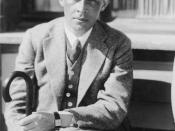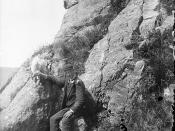In his novel "All Quiet On The Western Front"- first published in German as Im Westen nichts Neues in January 1929 - German Author Erich Maria Remarque purposefully destroys the nationalistic ideas readers at the time would have had about the war. He claims in his epigraph - "This book is intended neither as an accusation nor as a confession, but simply as an attempt to give an account of a generation that was destroyed by the war - even those who survived the shelling." He presents the brutality of the First World War, in which he took part, through vivid descriptions of trench warfare and the changes it makes to the minds of the group of young German soldiers he concentrates on. The novel centres around the experiences of narrator Paul Bäumer and his company, as one by one they lose the lives which were already ruined by war.
Most of Germany's youth were pushed into war by nationalistic elders. In the novel, this theme is shown through Paul's teacher Kantorek. As schoolboys, Paul and his friends were under the impression that Kantorek was a knowledgeable man, whose authority was derived from his wisdom. As soldiers, they quickly learn to see through Kantorek's nationalistic rhetoric, and soon grow to despise him. The fact that Kantorek is eventually drafted, and makes a terrible soldier, reflects the uselessness of the ideals that he preaches: "There were thousands of Kantorek's, all of them convinced that they were acting for the best, in the way that was most comfortable for themselves. But as far as I'm concerned, that was the very root of moral bankruptcy. They were supposed to be the ones who would help us... but the first dead man I saw shattered this conviction"
The first time we are introduced to...


